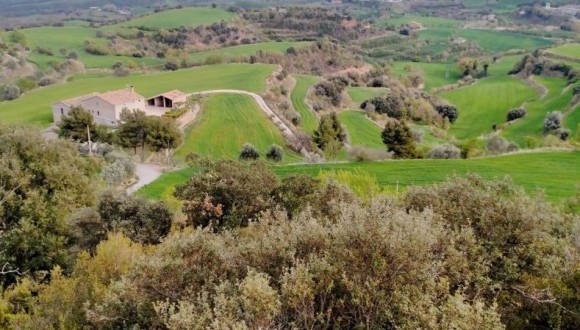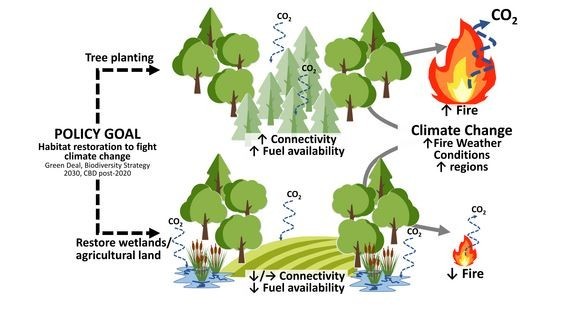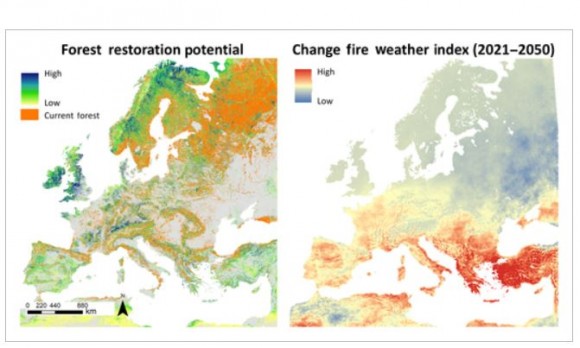Planting 3,000 million trees in Europe could increase the risk of forest fires
A research group made up of researchers from CREAF, CTFC, InBIO/CIBIO, University of Santiago de Compostela and CSIC warns that the massive reforestation proposed by the Green Deal could increase the risk of fire if it isn't carried out according to good planning and scientific criteria.
Forests are large reservoirs of carbon and contribute greatly to offsetting the increase in carbon dioxide in the atmosphere. For this reason, policies to conserve and restore them are widely supported as an effective way of combating climate change. The European Union, following the Green Deal roadmap towards a decarbonised economy, has committed itself to restoring the habitats with the greatest potential to capture and store carbon. Among other things, has committed to forest restoration through various initiatives, one of which is to plant 3,000 million trees by 2030.

A research team made up of researchers from CREAF (Spain), CTFC (Spain), InBIO/CIBIO (Portugal), University of Santiago de Compostela (Spain) and CSIC warns that the massive reforestation proposed by the Green Deal could increase the risk of fire if it is not carried out according to good planning and scientific criteria. The article Tree-planting: a double-edged sword to fight climate change in an era of megafires recently published in Global Change Biology, explains that in the era of large forest fires, reforestation can be a double-edged sword to combat climate change.
It is essential to plan very well how and where these plantations will be made: what species and how they will be managed. Aspects that are key if we want to be effective in reforestation and avoid risks associated with large forest fires", adds Lluís Brotons, CSIC researcher at CREAF and in the mixed unit InForest CREAF-CTFC.
Virgilio Hermoso, researcher at the CTFC, points out that "we don't question the use of plantations, but we must plan them correctly so as not to cause the opposite effect to the one we are looking for. The increased connectivity of the forest, on a landscape scale, together with the use of species that are often used in plantations (fast-growing and with flammable resins), can increase the risk of fire, especially if it is not accompanied by appropriate forest management".
This new era brings together prolonged droughts and extremely hot or windy weather conditions that cause an increase in high-intensity fires, already evident in the Mediterranean basin, and increasingly frequent in other northern areas of Europe. This is why "it is essential to plan very well how and where these plantations will be made, that is to say, which species and how they will be managed”. According to Lluís Brotons, CREAF and CSIC researcher, “these aspects are key if we want to be effective in reforestation and avoid the risks associated with large forest fires”.

The alternative: restoring other habitats
The authors propose alternatives that could be as or more effective than this massive reforestation plan. The diversification of habitats or the recovery of wetlands and pastures, especially in some regions of southern Europe, are a good example. Both actions would help to compensate for the loss of habitats, which have declined sharply in recent decades due to land abandonment and forest expansion, and would maintain traditional and cultural practices and landscapes that are more resistant to fire. In fact, investing in the restoration of these other habitats would be more efficient than planting trees in drier, more fire-prone regions, such as the Mediterranean, where water availability is limited.
Researcher Virgilio Hermoso also stresses that "large-scale reforestation can impact on areas of traditional agricultural activity, leading to abandonment or displacement, causing the loss of other important conservation habitats, the spread of invasive species and pests, and reducing water availability".

However, it is recognised that restoring forests by planting trees or helping them to recover naturally will undoubtedly contribute to the overall strategy to mitigate the impacts of climate change. The first proposed targets for the Convention on Biological Diversity to be agreed in 2021 include the restoration of 350 million hectares of deforested and degraded land worldwide. Globally, priority should be given to areas that have been subject to the highest deforestation pressure in recent decades, where investment will be most effective, such as the tropics, and always bearing in mind that forest restoration cannot replace the reduction of direct greenhouse gas emissions, the priority and most effective action to combat climate change.
More information:
Hermoso, V., Regos, A., Morán-Ordóñez, A., Duane, A., Brotons, L. (2021). Tree-planting: a double-edged sword to fight climate change in an era of megafires. Global Change Biology (in press).







